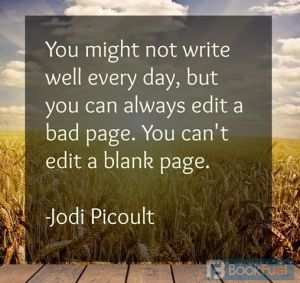
But while the sentiment represents the truth, it is not the whole truth. Not by a long shot…
A lot of people, while trying to express this same idea as a means to encourage a discouraged writer, will go a step further. They might say something like, “Every first draft is crap.” They will often do this with a slightly saltier statement that is attributed to Hemingway. There are a few problems with that. First of all, the only source of the Hemingway quote is a biographic manuscript based on notes an admirer of Hemingway wrote down in 1934, but not compiled until a few decades later, then moldered in a box somewhere until after both Hemingway and the admirer had died, whereupon it was edited by a surviving relative of the admirer. There are other reasons many experts doubt Hemingway actually said every first draft is always rubbish. Even if Hemingway did say that the first draft is always rubbish, he was absolutely wrong.
Your first draft will not be perfect. Your first draft will have things you want to change later. Both of those statements are true. But if you replace the word “first” in each sentence with the word “final,” the resulting sentences will be precisely as true as the originals. No draft is perfect. No draft is free of phrases, paragraphs, or plot points that the author won’t second guess years after the book has been published. This is just as true of bestsellers that win dozens of awards as books that never sell.
Don’t get me wrong. Your first draft may be garbage. But again, so might your tenth draft. But your first draft may also be pretty good. A more accurate statement about first drafts was once made by Bernard Malamud (in a commencement speech at Bennington College in 1981): “The first draft of anything is suspect unless one is a genius.”
It is quite likely that things need to be fixed in your first draft. The things needing to be fixed might be as minor as inconsistently spelling a minor character’s name. Or they may be more serious, such as losing a character entirely. You may find that you started out writing a silly love story only to reach the end and have a horror-mystery.
But that’s okay. It’s a draft. You’ll need to set it aside for a while, then read it, start making notes about things you want to fix. At some point you’ll want to get beta readers that you trust to tell you honestly whether the story works for them. There is work to be done.
And it’s okay if, when you read your draft, you feel that most of it is rubbish. If you do, you’re probably being overly harsh on yourself. It’s quite common. And it can be very discouraging to look at something you wrote and see only the flaws. This is the reason many people repeat the apocryphal Hemingway quote. They’re trying to fight that discouragement with some hope: if very successful and critically acclaimed authors wrote crappy first drafts that they turned into masterpieces, then you can turn your first draft into something better.
Whether you are being overly harsh or assessing the first draft accurately, doesn’t matter. What matters is what you do with it next.
Revise it. Fix it. Make it better.
Your first draft is meant to be imperfect. Just as a gesture drawing an artist makes in preparation for a picture, it’s roughing out the shape and reach of the final piece, but it is not the piece itself. Its purpose isn’t the be the tale, it’s to help you get the tale completed. Completing the tale may mean making only some corrections, shading in some details, tightening the dialog here and there. Work the draft until the story is ready.
When it’s done, move on to the next story. Yes, try to find a publisher or an audience for your revised story. Make the rounds, see if anyone likes it. But while you’re doing that, you must also already be working on the first draft of the next story.
And whether you find an audience for your first story also doesn’t matter. Just as it doesn’t matter that the first time a toddler tried to walk (likely the first dozen times the toddler tried to walk), they fell down. Because eventually they figured out how to walk and even run.
Your next first draft will be better than your last. If you keep at it, putting one word after the other, and then one story after the other, you will get better. And you get better not by wallowing in what’s wrong, but by making it right.
Thanks for the wonderful advice! I do agree that the first draft will not be perfect, and you have to keep revising it. Also, I firmly agree with the ‘once the first project is done, move on to the next one.’ Currently, I’m working on two stories, but I want to finish them by the end of the year. Next year, I plan to work on some new stuff.